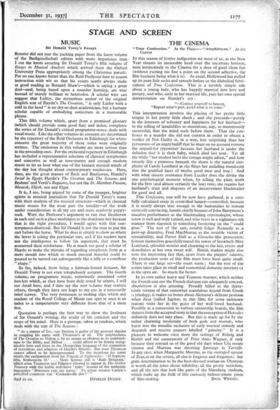STAGE AND SCREEN
MUSIC
Sir Donald Tovey's Essays
Rossna did not tear the packing paper from the latest volume
ef the Bachgesellschaft edition with more impatience than I cut the knots securing Sir Donald Tovey's fifth volume of Essays in Musical Analysis which arrived from the Oxford University Press appropriately among the Christmas parcels. For no one knows better than the Reid Professor how to season instruction with wit so that his essays nearly always make
as good reading as Bernard Shaw's—which is saying a great deal—and, being based upon a sounder learning, are wise instead of merely brilliant or heterodox. A scholar who can
suggest that Lidley, the mysterious author of the original English text of Haydn's The Creation, " is only Linley with a cold in the head " is no dry-as-dust academician, but a humane scholar capable of embodying conjecture in a memorable phrase.
This fifth volume which, apart from a promised glossary (which should provide some good fun) and index, completes the series of Sir Donald's critical programme-notes, deals with vocal music. Like the other volumes its contents are determined
by the repertory of the Reid Orchestra in Edinburgh for whose Concerts the great majority of these notes were originally written. The omissions in this volume are more serious than in the preceding ones. For the orchestral repertory in Edinburgh
has included a representative selection of classical symphonies -and concertos as well as tone-poems and enough modern music to let us hear what one of the keenest musical minds of
the day has thought about contemporary tendencies. Here, then, are the great masses of Bach and Beethoven, Handel's Israel in Egypt, Haydn's The Creation and The Seasons, and Brahms' and Verdi's Requiems, but not the Sr. Matthew Passion, Messiah, Elijah, nor any Elgar.
It is, I see, being argued by some of the younger, brighter spirits in musical journalism that Sir Donald Tovey's notes with their analysis of the musical structure—which in classical music means for the most part the tonality—of the work under consideration is all my eye and mere academic poppy- cock. Were the Professor's argument to run that Beethoven in such and such a place modulates to the dominant key because that is the right procedure, I would agree with this con- temptuous dismissal. But Sir Donald is not the man to put the cart before the horse. What he does is simply to show us where the horse is taking the particular cart, and if his readers have not the intelligence to follow his argument, that must be accounted their misfortune. He is much too good a scholar of Haydn to make the mistake of regarding symphonic form as a mere mould into which so much musical material could be poured to be turned out subsequently like a jelly or a cornflour " shape."
So far, indeed, from being a formula-bound lecturer, Sir Donald Tovey is not even scrupulously accurate. The fourth volume, on programme music, notoriously contained some howlers which, as they have been duly noted by others, I will not detail here, and I dare say the new volume may contain others, though they have not leapt to my eye in a necessarily brief survey. The very proneness to making slips which any student of the Royal College of Music can spot at once is an index to a temperament very different from that of a mere don.
Quotation is perhaps the best way to show the liveliness of Sir Donald's writing, the acuity of his criticism and the scope of his mind. Here is a passage, taken at random, which deals with the text of The Seasons :
" As a matter of fact, van Swieten is guilty of the grossest slander in coupling his name with Thomson's at all. The indebtedness "of The Creation to Milton is by no means as obvious as its indebted- ness to the Bible, and Milton . . . could afford to be faintly recog- nizable here and there in the Mongrelian language of the committee of translators and adaptors of Haydn's libretto. But poor Thomson cannot afford to be misrepresented. To the incurious his name recalls the exclamation from his Tragedy of Sophonisba : 0 Sophon- isba, Sophonisba . . . More famous still is 'Rule Britannia,' which even Tennyson and Palgrave allowed to appear in The Golden Treasury with the feeble indicative ' rules ' instead of the authentic imperative Britannia rule the waves.' To either version Carlyle's pencilled comment waS Cockadoodle doo ! '
































 Previous page
Previous page